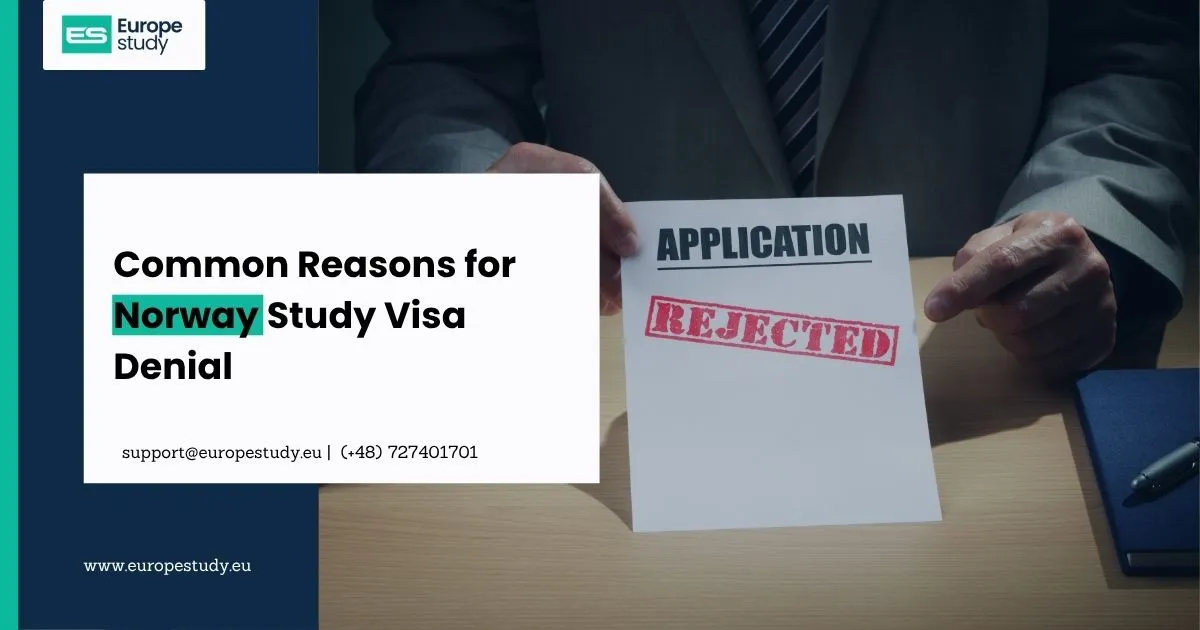
Common Reasons for Norway Study Visa Denial
Pursuing higher education in Norway is an exciting opportunity, thanks to its world-class universities, free tuition, and high standard of living. However, securing a study visa is a critical step—and one that can sometimes lead to disappointment. Understanding the common reasons for Norway study visa denials can help you avoid mistakes and strengthen your application.
Here’s a comprehensive overview of the most frequent reasons for visa rejection and tips on how to address them:
1. Incomplete or Inconsistent Documentation
Missing Documents:
Failing to provide all required documents—such as your university acceptance letter, completed visa application, passport copies, proof of finances, or insurance—can lead to an automatic rejection.
Inconsistencies:
Any mismatched information between your application form and supporting documents can raise red flags. Ensure all details are consistent, accurate, and clearly presented.
Tip: Double-check your application checklist and ensure every document is correctly filled out, translated (if necessary), and current.
2. Insufficient Financial Proof
Demonstrating Financial Capacity:
Applicants must prove they can support themselves throughout their studies in Norway. This includes covering tuition (if applicable), living expenses, and other essential costs.
Proof of Funds:
You may be asked to provide recent bank statements, a financial guarantee, or official sponsorship letters. These must clearly show that the funds are accessible and sufficient.
Tip: Ensure your financial documents are recent, verifiable, and meet or exceed the financial requirements set by the Norwegian Directorate of Immigration (UDI).
3. Weak Ties to the Home Country
Demonstrating Intent to Return:
Norwegian authorities want to see that you plan to return to your home country after completing your studies, rather than using the visa as a pathway to permanent immigration.
Evidence of Ties:
Providing proof of strong family connections, property ownership, employment prospects, or ongoing obligations in your home country can help support your case.
Tip: Include a clear explanation of your post-study plans and show how your education in Norway will benefit your career back home.
4. Previous Visa Violations
History of Non-Compliance:
Applicants with a history of overstaying visas, working illegally, or breaking immigration laws in any country may face rejection.
Tip: If you’ve had issues in the past, be honest in your application and provide context or proof of rehabilitation, where applicable.
5. Unclear Travel or Study Intentions
Lack of Purpose:
Applicants must clearly demonstrate that they are genuinely pursuing education and not using the visa for unrelated purposes.
Weak Statement of Purpose:
A vague or generic statement of purpose can harm your application. You need to show genuine interest in the chosen program and how it fits into your long-term goals.
Tip: Write a focused, personal, and specific statement explaining why you chose the program, how it aligns with your career, and why Norway is the right destination.
6. Other Potential Reasons for Denial
-
Criminal Record or Security Concerns: A history of criminal activity or involvement in security risks can lead to immediate rejection.
-
Poor Academic Background: If your grades or qualifications don’t meet the university or visa standards, it may cast doubt on your ability to succeed.
-
Language Barriers: Some programs require proficiency in English or Norwegian. Failure to meet these requirements may result in denial.
-
Medical Issues: If your health poses a risk to public health or you fail to meet medical criteria, your application could be declined.
A successful Norway study visa application depends on preparation, transparency, and demonstrating genuine academic intent. By understanding and addressing the common reasons for rejection, you can significantly improve your chances of approval.
Always review the official guidance from the Norwegian Directorate of Immigration (UDI) or consult with your university’s international office for tailored support and up-to-date requirements.





